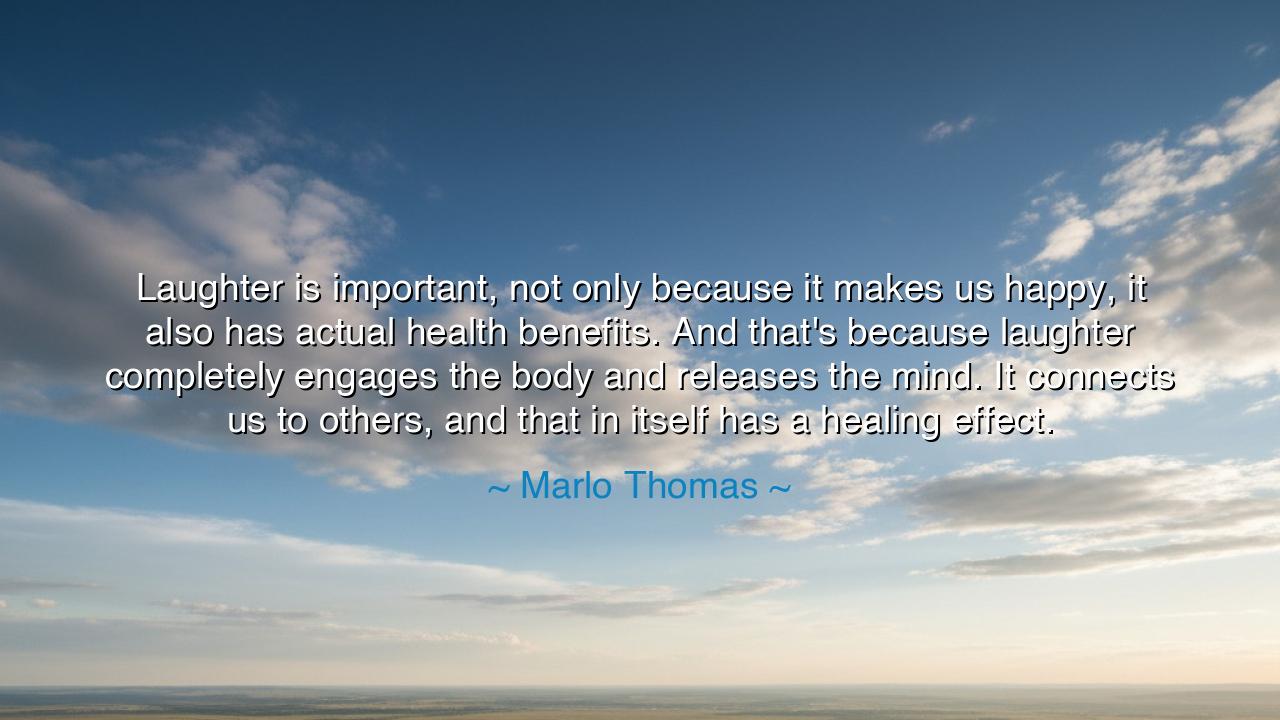
Laughter is important, not only because it makes us happy, it
Laughter is important, not only because it makes us happy, it also has actual health benefits. And that's because laughter completely engages the body and releases the mind. It connects us to others, and that in itself has a healing effect.






In a world often burdened by sorrow and striving, the radiant voice of Marlo Thomas reminds us of one of life’s simplest yet most profound gifts: “Laughter is important, not only because it makes us happy, it also has actual health benefits. And that's because laughter completely engages the body and releases the mind. It connects us to others, and that in itself has a healing effect.” These words, though soft in tone, ring with the strength of eternal truth. For laughter is not mere sound or mirth — it is the music of the soul, the breath of renewal that turns pain into power and solitude into communion. Thomas, who has long championed compassion and healing through her work, speaks here not as an entertainer alone, but as a sage of the heart.
To understand the meaning of her words, one must look beyond the surface of joy and see laughter as a sacred act — a bridge between the body and the spirit. When she says that “laughter completely engages the body and releases the mind,” she describes not only a physical reaction but a spiritual awakening. In laughter, the muscles loosen, the breath deepens, and the tight grip of anxiety is broken. The heart, long burdened by the weight of worry, begins to beat again in rhythm with the pulse of life. Science now confirms what ancient wisdom always knew: laughter strengthens the immune system, reduces stress, and fills the body with healing energy. Yet, long before medicine measured it, the wise knew that laughter could do what no tonic could — it could restore the human spirit.
The origin of this truth stretches back to the dawn of storytelling itself. In the courts of kings and the huts of peasants, the jester and the fool played a sacred role. They were not mere clowns but healers of the collective soul. When a kingdom was weary with grief, when hearts grew heavy under the weight of despair, it was the fool’s laughter that reminded men they were still human, still alive, still capable of joy. Laughter, in its purest form, is rebellion against despair — a defiance of the darkness that seeks to swallow us whole. It is the spark of divinity that refuses to die, even in the face of suffering.
Consider the story of Norman Cousins, a man who, stricken with a severe and painful illness, turned to laughter as medicine. He watched comedies and surrounded himself with joy, and through this strange prescription, he began to heal. His doctors marveled as his pain subsided and his strength returned. Cousins later wrote that ten minutes of genuine laughter gave him hours of relief — proof that the spirit, when freed through joy, can awaken the body’s own power to mend itself. His story echoes the wisdom of Marlo Thomas’s words: that laughter does not merely make us happy — it heals. It restores balance where there is pain, and connection where there is isolation.
And what of that connection she speaks of — that laughter “connects us to others”? In laughter, all barriers fall away. Rank, wealth, and difference dissolve; for when we laugh, we stand as equals, bound by the shared miracle of being alive. A shared laugh can heal rifts that argument cannot. It is a universal language, understood by every culture and child, capable of uniting hearts more swiftly than words ever could. The healing effect of laughter, then, is not only within the body but between souls. It is the balm of fellowship, the fire that warms even the coldest distance between human beings.
Yet, in our modern age, laughter too often becomes scarce. We drown ourselves in work, in worry, in the solemnity of responsibility, forgetting that the world itself was not meant to be endured but embraced. The ancients knew better: the Greeks celebrated comedy alongside tragedy, believing that joy was as essential to wisdom as sorrow. Even the Buddha is said to have smiled upon enlightenment, knowing that laughter, like compassion, is a form of awakening. It is the release of illusion, the recognition that life, though fleeting and imperfect, is still wondrous.
Therefore, O seeker of balance, remember this teaching of Marlo Thomas. Do not scorn laughter as frivolous, for it is as vital as breath. Let it rise freely, even in dark times — especially in dark times. Surround yourself with those who bring you joy, and become a source of laughter for others. Share humor not to mock, but to lift; not to escape life, but to engage it more fully. For laughter is the most ancient form of prayer — the body’s way of thanking existence for the gift of another heartbeat, another dawn.
The wisdom of Marlo Thomas is thus both gentle and heroic: that laughter is not the denial of pain, but its transformation; not an escape from reality, but an embrace of it. It is the soul’s affirmation that, no matter how heavy the world may grow, there is still light within us that cannot be extinguished. So laugh — deeply, honestly, often — and in doing so, you will heal not only yourself, but all those who hear your joy echoing through the corridors of life.






AAdministratorAdministrator
Welcome, honored guests. Please leave a comment, we will respond soon